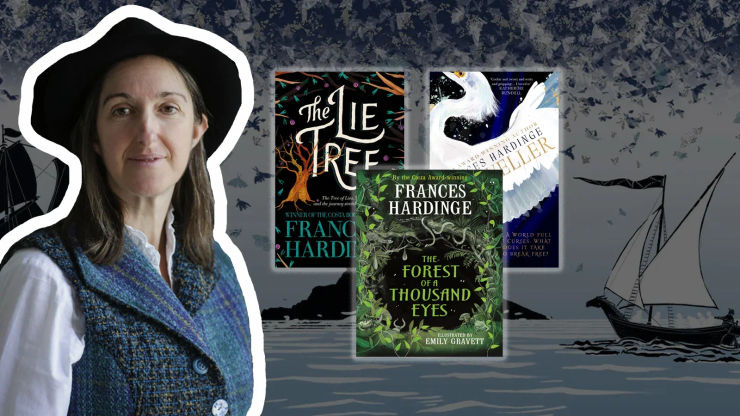Frances Hardinge's top ten writing tips
Award-winning novelist Frances Hardinge shares her advice for budding writers.

Want to be a writer, but don't know where to start? Frances Hardinge, author of acclaimed children's novels including the award-winning The Lie Tree, shares her top ten writing tips.
1. Be stubborn.
Talent isn't enough by itself. Write when you don't feel like it. Carry on with your story even after the first fizz of excitement wears off. Keep sending off your work, and don't give up.
2. Read widely.
Don't just stick to the kinds of books you already like. Experiment. The more styles you soak up, the better your chance of finding your own voice.
3. Write regularly.
This is tricky since most people are busy with school, work or family, so you end up feeling that you “don't have time”. You have to force yourself to have time. I belong to two writers' groups that meet regularly, which gives me a deadline and impetus to write. (If I turned up to the session without having written anything new, my friends would laugh at me.)
4. Get feedback.
If you stare at your own work for long enough, you reach the point where you just can't see it properly any more. Show your work to somebody whose opinion you trust, and ask for comments. Be honest with yourself – deep down you'll know if their criticisms are right. Nobody enjoys making changes to their writing, but it's an important part of a writer's job.
5. Make sure your setting 'works'.
If you're inventing a world, it should make sense, even if it's a crazy kind of sense. I'm not saying that you can't put wild, weird, and wonderful things into your book, but even the most fantastical world should stick to its own rules. When you are asking yourself who and what is in your invented setting, you should also be asking yourself why and how. Give your world a history. Give people and cultures reasons for the things they do. Work out what your monsters eat. You don't need to mention the whole background in your book, but make sure you know how it works. If the setting feels real to you, then you have a better chance of making it seem real to the reader.
6. Make sure your characters make sense in their setting.
People don't pop into existence fully formed, they are slowly created by the places and people around them, and the things that have happened to them. Book characters should be the same. Their past will affect everything about them - their dress, their character, their beliefs, and the way they talk. Even rebels are rebelling against something.
7. Don't forget the 'boring' stuff.
You may be writing a story about horror, revenge, love, magic, or saving the world, but don't forget that actual people also have to worry about food, sleep, money, shelter, warmth, and washing. If they can't get these things because they're on the run, moving cross-country or in enemy territory, it'll affect them. Hungry people lose concentration and become cranky or dizzy. Tired people squabble, forget things, have slower reactions than usual, and sometimes even hallucinate. Travellers who have trekked for a week without being able to wash properly will probably smell pretty bad. You can use details like this to make your characters more believable.
Remember also that a lot of people will probably have to organise their lives around getting money so that they can afford to eat. (The dark secret of Dread Swordsman X may not be some long-forgotten duel, it may be the fact that he can only pay the bills by doing the washing up for the local tavern.)
8. Use what you know.
You can use 'ordinary' memories to help you describe extraordinary things. You may not have ridden a wyvern, but if you've ridden a rollercoaster you can describe the weightlessness of the downwards whoosh. You may never have fled a torch-wielding mob, but if you've ever been bullied you can describe what it's like to feel outraged, frightened, hurt and alone. You may not have fallen off a roof during a midnight chase, but if you've ever broken your arm you can describe the pain and slow recovery.
9. Research!
If you don't know something, look it up. If you're writing about a volcano but don't know what it would be like to witness an eruption, look it up. If you're describing a swordfight but don't know any fencing terms, look them up. If you want to describe a huge medieval feast, but can't think of any dishes except 'pies and pigs with apples in their mouths', then look it up. If you're drawing on some real information, then it'll make your world and your plot feel more detailed and believable.
10. Don't be afraid to send off your work.
Nearly every published author had to scramble over a big heap of rejection letters before they got published. I certainly did. It's completely normal. The most sensible way to regard rejection letters is as trophies - they're proof that you're taking your writing seriously. Go for it – and good luck!


